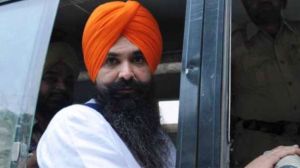Basu’s battle — CPI(M) search for power-sharing programme
There is little mystery about what Jyoti Basu means when he speaks with evident expectancy about the CPI(M) planning a special Congress to ...

There is little mystery about what Jyoti Basu means when he speaks with evident expectancy about the CPI(M) planning a special Congress to review and possibly revise the party programme. He hopes to carry forward the inner-party struggle, which he initiated some time ago, for the belated correction of a “historic blunder”. The bitter reference was to the fact that his party and himself were made to miss the bus to shared power at the Centre by a fossilised “programme”. The West Bengal Chief Minister, who holds a record for the length of his stay in State power, would have set a more remarkable one as the country’s first Left Prime Minister, but the outdated document did not help the party respond with a rousing Dilli chalo. The mantra of "people’s democracy" — which, in practice, only means that the Marxists can join a political alliance as its dominant member alone — prevented the party from becoming a junior partner of the United Front Government. When his scornful disapproval of the slogan caused much more than a flutter in the Marxist dovecotes, Basu was forced to stage a tactical retreat.
Obviously, however, he has not abandoned the battle, in which he has CPI(M) general secretary Harkishan Singh Surjeet’s backing. The success of the revisionists (who will doubtless see red in such a description) cannot be ruled out: they have sophistry enough to sell the ideological shift.Basu has talked of the change in “the national scenario” calling for a reconsideration of the programme. Even hardliners can be kept happy, perhaps, if the era of coalitions at the Centre is held to be an expression of a new co-relation of class forces. A revision of the programme as a result of the Congress will, of course, come too late for the comfort of the present coalition rulers. But, it will be welcome in principle to a large section of political opinion and to all those who have been watching with dismay the role of the Left, particularly the CPI(M) as its leader, in the UF dispensation. Hope will be raised about the new party line making some wholesome difference to the old Left practice of hunting with the hound and running with the hare. The point, however, is that a partial reappraisal and recasting of the programme will hardly suffice to serve the avowed purpose.
Several communist parties have carried out reviews and revisions of their programmes after the collapse of the Soviet Union, but these have been more fundamental than the one being planned by the CPI(M)’s severely limited futurists. Basu’s party is almost alone in refusing to make any ideological break with the Cold War past. Orthodoxy of a crassly obstinate kind cannot coexist peacefully with power-sharing at the Centre. The Marxist economic platform provides an important example. “No socialism in a single State” is a clever apology for compromises made on this front in West Bengal. But, a party setting its sights higher needs to examine afresh its basic economic tenets for their practicability. Jyotibabu may only be talking about the need for the Marxists to jump on to a bandwagon. By piecemeal changes in its over-three-decade-old programme, however, the party cannot show its readiness to part with power by proxy and without responsibility.
Photos



- 01
- 02
- 03
- 04
- 05




























